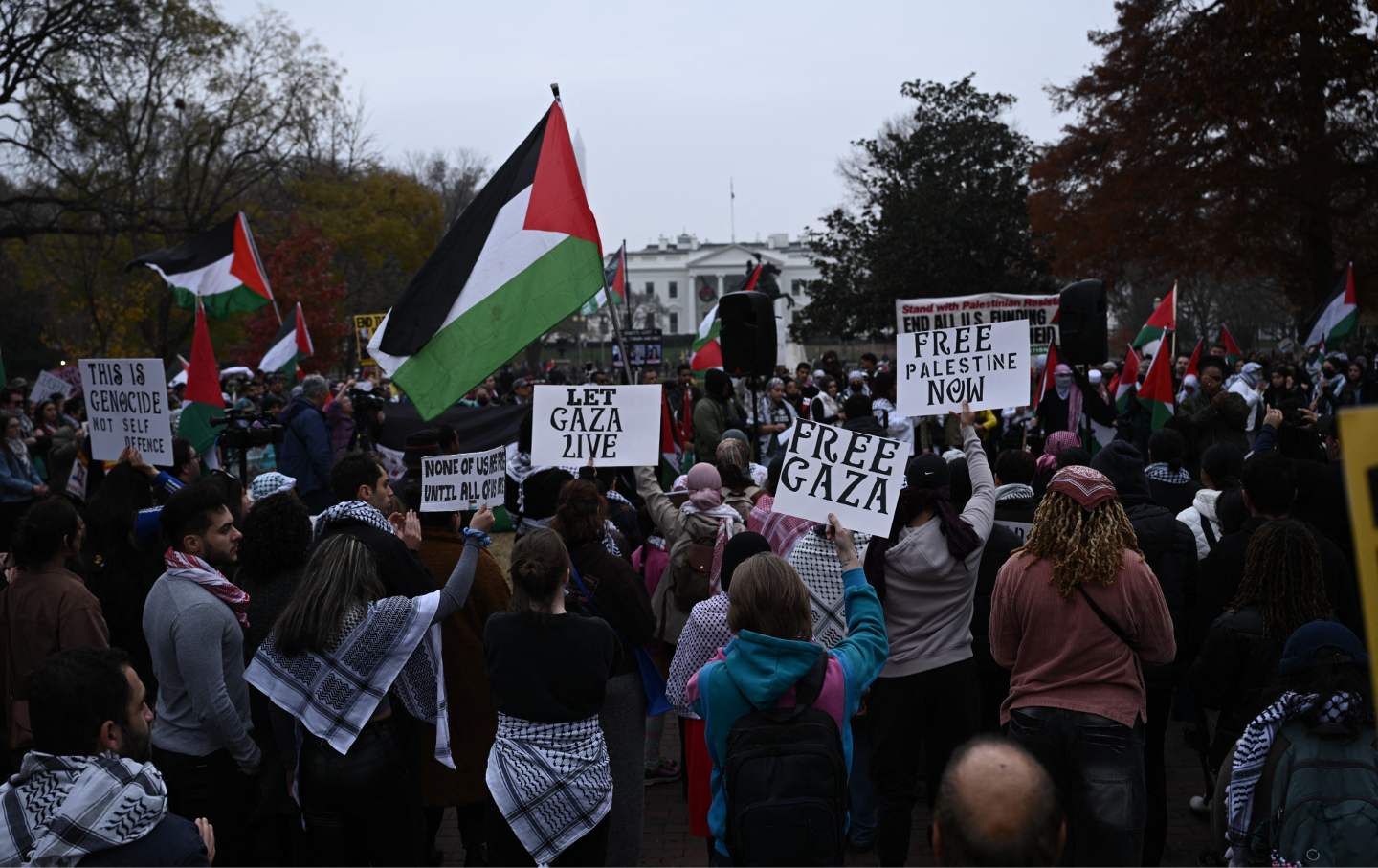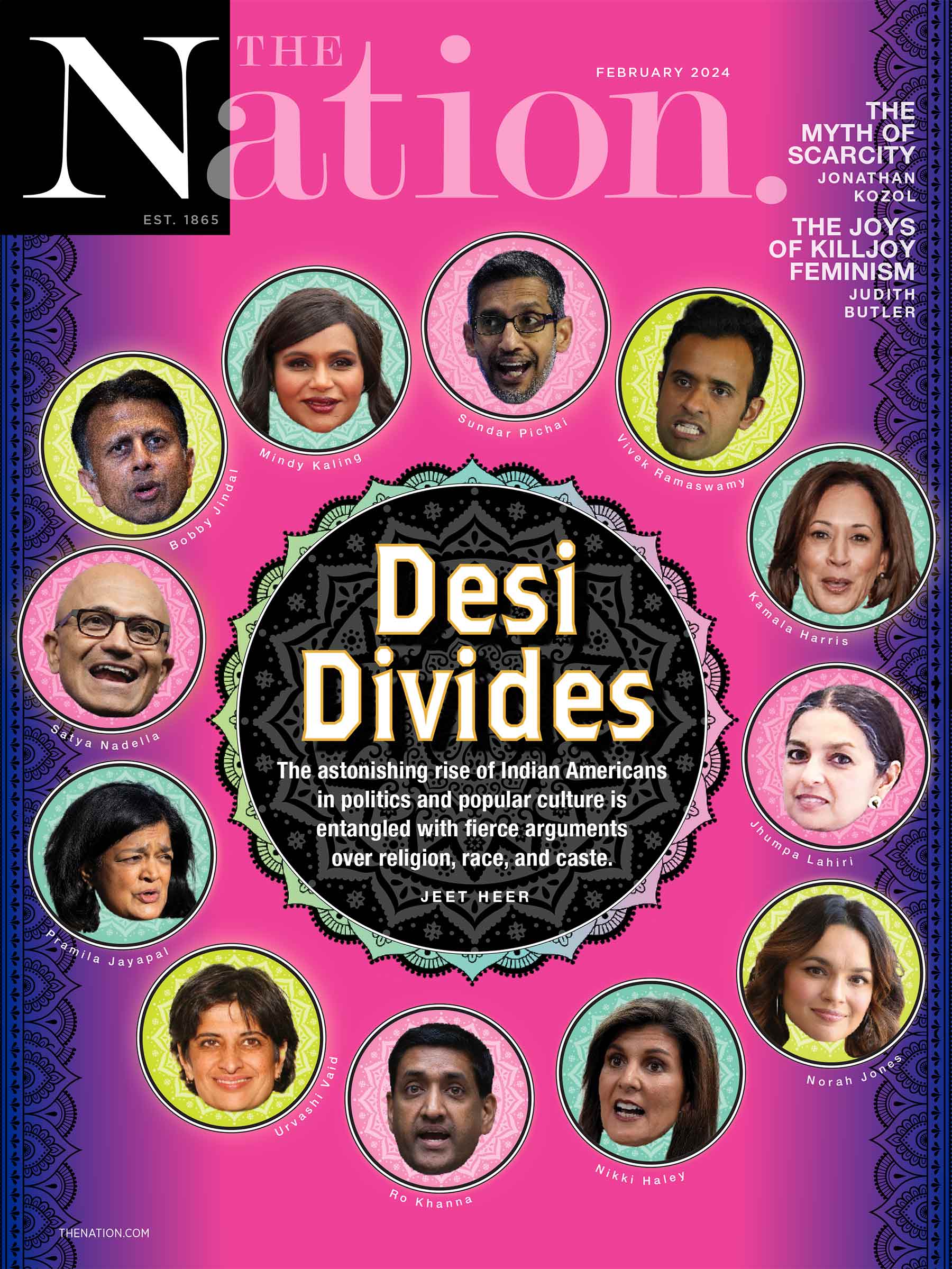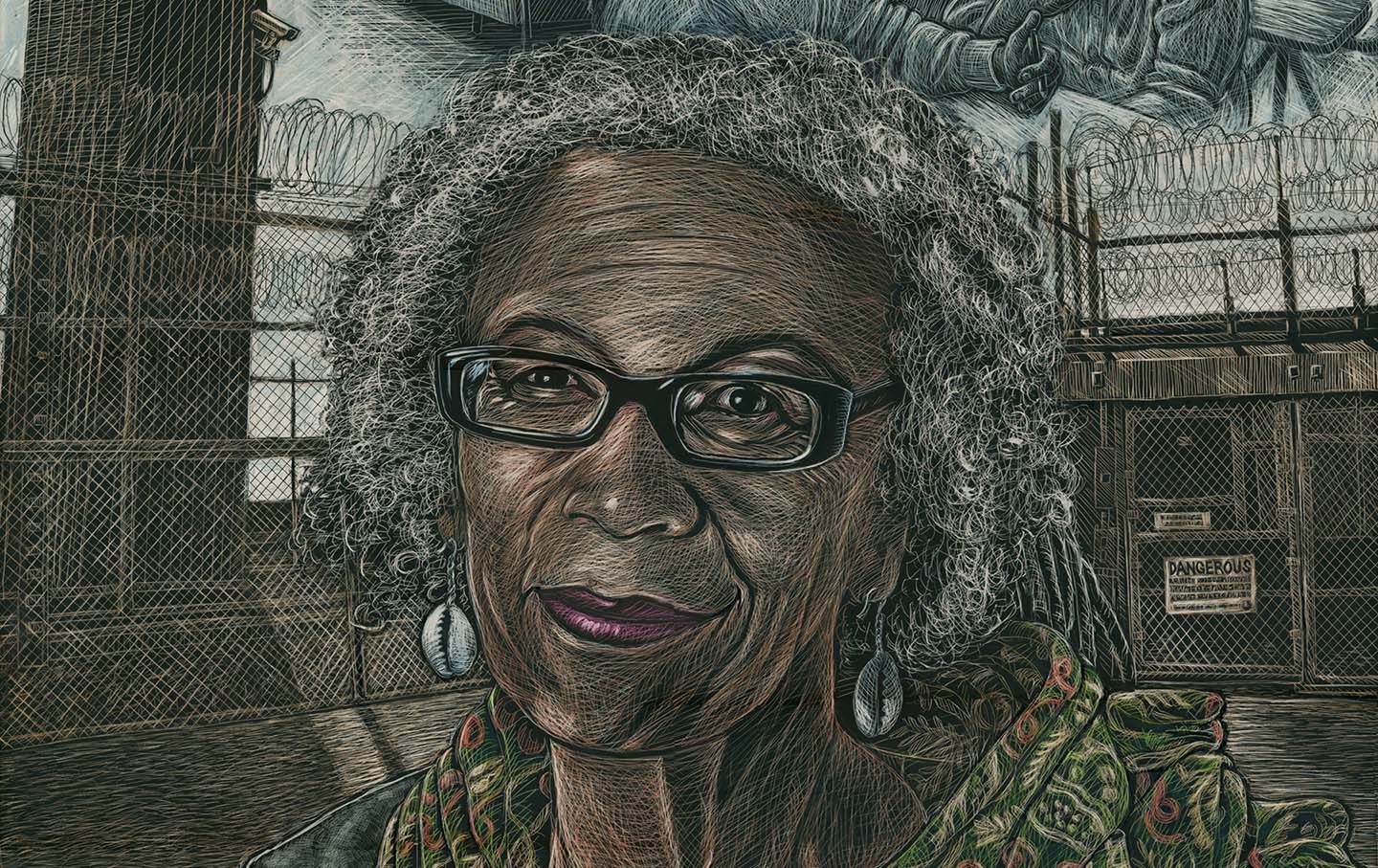Activism
/
December 5, 2023
It is unquestionably risky to show support for Palestinians. But the bigger risk is saying nothing at all.

Demonstrators gather in front of the White House during a rally in support of Palestinians in Washington, D.C., on December 2, 2023.
(Brendan Smialowski / AFP via Getty Images)
In her commencement speech to Barnard College’s graduating class of 1976, Toni Morrison reminded her audience: “You are moving in the direction of freedom, and the function of freedom is to free somebody else.” Morrison recognized that the women to whom she was speaking would be uniquely empowered to “determine which life is expendable and which is indispensable.” She warned them that it was their responsibility to use their newfound empowerment to liberate rather than to oppress.
Amid Israel’s war on Gaza in 2023, many of us are asking how we can use our positions in society to stop the oppression of the Palestinian people. The past few weeks have offered ample evidence of the dangers that come with criticizing Israel’s bombardment of Gaza. Simply for circulating a cease-fire petition, David Velasco was fired from Artforum. A wave of resignations by his colleagues followed. Journalists have been fired and forced to resign from major media outlets for showing sympathy for Palestinians. The list could be extended ad infinitum and it will probably never stop growing, at least not until Palestine is free.
Under such circumstances, why would anyone want to speak out? Why risk losing your job if there is no guarantee that you will be saving lives? For some, it can be difficult to find the moral high ground, given that both Hamas and Israel are guilty of atrocities. But I suspect that a much larger number of people who choose not to speak out have engaged in a cost-benefit analysis and decided that it just isn’t worth the cost of speaking out for Palestine.
Some are actively forbidden from doing so due to the conditions of their employment. For them, the only way of speaking out is to resign, like Josh Paul of the Department of State’s Bureau of Political and Military Affairs. The vast majority of those who are silent, however, do not have this excuse. They have chosen to remain silent of their own accord, in the belief that speaking out will not make a difference and could potentially endanger their livelihoods.
Fear of unemployment is a valid concern, particularly in a society like the United States that ties health insurance to employment. “If we had universal healthcare it would make it a bit easier for people to stand up on principle,” Josh Paul said, in explaining why more government employees did not resign in protest at the Biden’s administration’s pro-war policy. When our healthcare is at risk, it is understandable that some may be silent. They too can contribute to the anti-war effort behind-the-scenes, and their dilemma ought to remind us of just how interconnected the struggle for global justice is with securing basic employment rights at home.
For many, the cost of speaking out goes beyond unemployment or social ostracization. Even in the US and the UK, visibly protesting on behalf of Palestine can be a matter of life and death. The three Palestinian-Americans who were shot in Vermont in late November were merely wearing a keffiyeh and speaking Arabic.
But such violence mandates that those of us who can speak freely do so. By not speaking out, we are relinquishing one of the great benefits of living in a democracy. If we don’t use this benefit when it feels most risky, we may forfeit the ability to speak at all.
Current Issue

A wave of killings took place in Iran between 1994 and 1998, which came to be known as the “chain murders.” These killings targeted writers, translators, and poets. They were persecuted by the state because they had signed an open letter, titled “We Are the Writers,” in which they criticized censorship and called for the establishment of a writer’s union. One by one, the signatories of the letter were murdered. The first to be killed was the poet Mohammad Mokhtari, the translator of Russian poets Anna Akhmatova and Osip Mandelstam. Next was the Mohammad Jafar Pouyandeh, who translated the Universal Declaration of Human Rights into Persian. Their bodies were found strangled in Tehran. Through these murders, the state sent a message to all poets, writers, and translators: Don’t dissent, or it may cost you your life.
In Turkey, 700 scholars were criminally charged with circulating propaganda for a terrorist organization in 2016, after they signed a letter criticizing the government in Ankara for massacring Kurds during clashes between Turkish security forces and the Kurdistan Workers’ Party. Two hundred of these were eventually sentenced and received prison terms of up to three years. Those who were not criminally charged were subject to investigation by their universities, often leading to loss of employment. Many were compelled to leave their country.
Palestinian academics in Israel have lost their jobs merely for expressing solidarity with Palestinians in Gaza. Even Jewish Israelis are not immune if they criticize the military state. On October 25, Israeli professor Nurit Peled-Elhanan paraphrased Jean-Paul Sartre in a WhatsApp group that was discussing the Hamas massacre of October 7: “After so many years that the neck of the occupied has been suffocating under your iron foot and suddenly was given a chance to raise his eyes, what kind of gaze did you expect you would see there?” She added: “We saw this gaze” on that day of the massacre. Her frank admission was to prove decisive in her downfall. Within hours Peled-Elhanan was summoned to a meeting with her employer, who told her that she was at risk of having her employment terminated for “displays of understanding to the horrific act of Hamas.”
Another social science teacher in Israel, Meir Baruchin, was fired without warning for posting on Facebook about his opposition to the killing of innocent Palestinian civilians. Palestinians in Israel are under much greater threat than their Israeli counterparts, and the mere expression of support for the civilians of Gaza is actively criminalized. Meanwhile, in Gaza, where life itself is at risk, the war has become the deadliest on record for journalists, with at least 60 Palestinian reporters and media workers killed.
The criminalization of sympathy and basic sociological awareness is well underway in the US, the UK, and other liberal democracies. But it has not reached anywhere near the fascistic dimensions that we are seeing in Iran, Turkey, and Israel. So where there is space to push back, we must do so. Turkey provides an instructive example of how a democracy that supports the right to protest and which nurtures robust academic institutions can suddenly turn authoritarian. No political system is immune to this authoritarian turn, including our own.
The mandate to protect our democracy is part of the case for speaking out, which is not only about Palestine, but also about ourselves. If we don’t exercise the right to protest, we are in danger of losing it. If we refrain from signing petitions that call our institutions to account, we are in danger of being permanently dominated by them.
Yes, it is possible that speaking out will extract an unfair cost from those who use their voice, their power, and their privilege to work towards a better world. But there is also a cost to being silent. Leaving aside the impact of silence on one’s conscience, keeping silent when an inner voice prompts us to speak out has a corrosive effect on democratic life.
Popular
“swipe left below to view more authors”Swipe →
As someone who has written a book about being falsely accused of antisemitism and who has been targeted by anti-Palestinian critics who would like to see me deprived of my livelihood, I never for a second regretted writing about the apartheid system that I saw while commuting between Bethlehem and Jerusalem. There are plenty of examples of people who have been unjustly censored for criticizing Israel, but in the United States and Europe, they often find ways to realize their talent in communities that respects their courage. The unspoken ban on criticism of Israel will not last forever. Every person who speaks out makes it less dangerous for others to do the same.
Those who speak according to the dictates of their conscience leave a mark on the world even when their bravery leads to short-term defeat. Even when they are fired, their courage does not go unnoticed; it inspires and empowers those around us. In Toni Morrison’s words, when we exercise our freedom, we set someone else free. There is certainly a cost to speaking out, but for the sake of our collective ability to speak—for our collective humanity—we must not be silent. Many of us living in democratic societies can afford the sacrifice. The risk is worth taking. The bigger risk is saying nothing at all.
More from The Nation

A prison abolitionist and prison scholar, she is the director of the Center for Place, Culture, and Politics.
OppArt
/
Jos Sances

Felecia Phillips Ollie DD (h.c.) is the inspiring leader and founder of The Equality Network LLC (TEN). With a background in coaching, travel, and a career in news, Felecia brings a unique perspective to promoting diversity and inclusion. Holding a Bachelor’s Degree in English/Communications, she is passionate about creating a more inclusive future. From graduating from Mississippi Valley State University to leading initiatives like the Washington State Department of Ecology’s Equal Employment Opportunity Program, Felecia is dedicated to making a positive impact. Join her journey on our blog as she shares insights and leads the charge for equity through The Equality Network.





Hi i think that i saw you visited my web site thus i came to Return the favore Im attempting to find things to enhance my siteI suppose its ok to use a few of your ideas
What i dont understood is in reality how youre now not really a lot more smartlyfavored than you might be now Youre very intelligent You understand therefore significantly in terms of this topic produced me personally believe it from a lot of numerous angles Its like women and men are not interested except it is one thing to accomplish with Woman gaga Your own stuffs outstanding Always care for it up
Ive read several just right stuff here Certainly price bookmarking for revisiting I wonder how a lot effort you place to create this kind of great informative website
I do not even know how I ended up here but I thought this post was great I do not know who you are but certainly youre going to a famous blogger if you are not already Cheers
Usually I do not read article on blogs however I would like to say that this writeup very compelled me to take a look at and do it Your writing style has been amazed me Thank you very nice article
Wonderful beat I wish to apprentice while you amend your web site how could i subscribe for a blog web site The account aided me a acceptable deal I had been a little bit acquainted of this your broadcast provided bright clear idea
Somebody essentially lend a hand to make significantly posts I might state That is the very first time I frequented your web page and up to now I surprised with the research you made to create this particular put up amazing Excellent job
Nice blog here Also your site loads up fast What host are you using Can I get your affiliate link to your host I wish my web site loaded up as quickly as yours lol
I was suggested this web site by my cousin Im not sure whether this post is written by him as no one else know such detailed about my trouble You are incredible Thanks
I do agree with all the ideas you have introduced on your post They are very convincing and will definitely work Still the posts are very short for newbies May just you please prolong them a little from subsequent time Thank you for the post